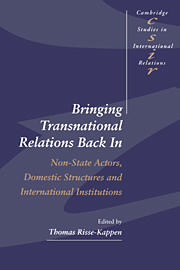 Bringing Transnational Relations Back In
Bringing Transnational Relations Back In Published online by Cambridge University Press: 02 December 2009
Multinational corporations (MNCs) are important transnational agents in the contemporary global political economy. Although they can be viewed as economic actors following the logic of international markets, their activities inevitably arouse questions of national power as well. Not surprisingly, such questions are most pronounced in the study of developing countries, where weak governments and societies potentially give the MNCs a strong bargaining position. Thus, the nature of the relationship between MNCs and developing countries and the implications of this relationship for economic growth remain highly controversial. For several decades, the debate occurred primarily between modernization theory (which saw MNCs as promoting growth in the periphery) and dependency theory (which argued that MNCs prevented or distorted growth). More recently, statist theory has argued that “strong and autonomous” states can regulate MNCs, thereby making them contribute to national development.
We are interested in this chapter in analyzing the role played by a host country's domestic structures in shaping the access and impact of MNCs. Access in this case is a product of bilateral negotiation between the firms and the host government (which has political jurisdiction to bar entry). The terms and extent of this access reflect the joint interests of these actors and their reciprocal bargaining leverage. Access (even if limited) is a precondition for impact which, in our case, refers to the size (large versus small) and nature (positive versus negative) of the MNCs' influence on their host's economic growth. Therefore, MNC impact is our dependent variable, while MNC access is the intervening variable.
To save this book to your Kindle, first ensure [email protected] is added to your Approved Personal Document E-mail List under your Personal Document Settings on the Manage Your Content and Devices page of your Amazon account. Then enter the ‘name’ part of your Kindle email address below. Find out more about saving to your Kindle.
Note you can select to save to either the @free.kindle.com or @kindle.com variations. ‘@free.kindle.com’ emails are free but can only be saved to your device when it is connected to wi-fi. ‘@kindle.com’ emails can be delivered even when you are not connected to wi-fi, but note that service fees apply.
Find out more about the Kindle Personal Document Service.
To save content items to your account, please confirm that you agree to abide by our usage policies. If this is the first time you use this feature, you will be asked to authorise Cambridge Core to connect with your account. Find out more about saving content to Dropbox.
To save content items to your account, please confirm that you agree to abide by our usage policies. If this is the first time you use this feature, you will be asked to authorise Cambridge Core to connect with your account. Find out more about saving content to Google Drive.